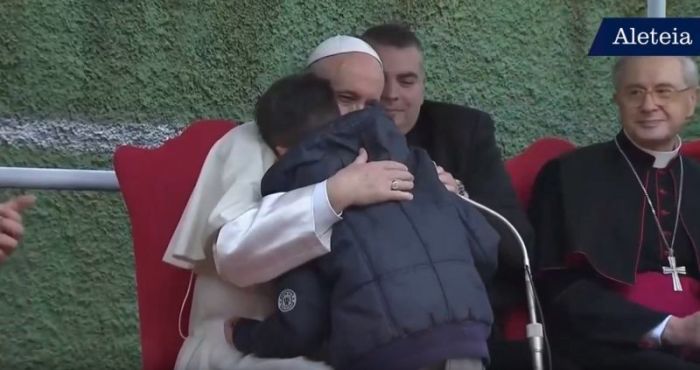Megachurch Pastor to Pope Francis: What You Should Have Told Boy About Atheist Father and Heaven

A pastor at a Virginia megachurch expressed disagreement with Pope Francis for the way the pontiff handled a question from a crying boy who asked him whether his atheist father is in Heaven.
The exchange between Francis and the young boy, Emanuele, took place in April at the Vatican when the pope was meeting with parishioners of St. Paul of the Cross before celebrating Mass.
The crying boy whispered a question to Francis, who then repeated it before the audience: "A short time ago, my dad died. He was an atheist, but he had all four of his children baptized. He was a good man. Is Dad in heaven?"
Francis said as part of his answer that it is a "beautiful" thing for a son to call his father "good."
The Roman Catholic Church leader then praised the unnamed father for baptizing his childen even though he himself wasn't a believer, and added: "God is the one who decides who goes to Heaven. But how does God's heart react to a Dad like that? How? What do you think? ... A dad's heart! God has the heart of a father.
"And faced with a dad, a nonbeliever, who was able to have his children baptized and to give them that courage, do you think that God would be capable of leaving him far from Him?"
Jordan Standridge, who serves as pastor of evangelism at Immanuel Bible Church in Springfield and grew up in Rome as the son of missionary parents, said in a blog post on Wednesday that Francis should have answered differently.
In his version of how he would have responded, Standridge reflected that he would comfort the boy by saying:
"I am so sorry this has happened. Anytime a loved one dies it is a tragedy that we don't know how to deal with, since the one we love has been taken from us. My heart is breaking with you over the loss of your father. I wish I could take the pain away but I cannot. All I can do is tell you about the One who can."
He said he would then explain to the boy that both Heaven and Hell are real places, and that the only way to end up in the former is by putting one's faith in Jesus Christ.
As for Emanuele's specific question, he wrote: "I wish I could tell you that your dad is in Heaven. I can't. I can tell you that if he repented of his sin, and placed his total faith and trust in Jesus even in his last days on earth, that he is. But I'll tell you something, wherever he is, he knows two things–that God is Holy, and that he wasn't."
The pastor of evangelism at Immanuel, which describes itself as a "non-denominational Bible Church with a strong tradition of exegetical preaching," argued at the end of his post that he realizes the pope "doesn't believe what I've written here, so we shouldn't expect him to be able to answer this way."
Earlier this year, Eugenio Scalfari, a 93-year-old atheist philosopher, claimed that Francis had told him that "Hell does not exist" and that "those who do not repent and cannot therefore be forgiven disappear."
The Vatican denied that the pontiff made those statements, arguing that what Scalfari reported "is the result of his reconstruction, in which the literal words pronounced by the Pope are not quoted."
Some Catholic priests, such as San Jose-based Jack Bentz, who works with the Jesuit Conference, have pointed out that Francis never actually told Emanuele that his father is or is not in Heaven.
"When Pope Francis says that 'God is the one who says who goes to Heaven,' he resists placing himself above God or making an idol of our human rules and limited understanding of God. He chooses to act on what he knows of God rather than to limit God by conjecture about the afterlife," Bentz wrote in America Magazine in April.
The Jesuit priest added that even though the Catechism of the Catholic Church seems to establish no way for nonbelievers to reach Heaven, only God decides at the end every person's fate.
"Sometimes we contrast the technical truth of church teaching with its pastoral application. As though the people of God cannot handle the truth but are best fed with weak platitudes of God's love. I do not think this is what Pope Francis was doing with young Emanuele. He was not just being nice, that way avoiding telling a little boy the hard truth that his father was not in Heaven. It doesn't work that way," Bentz insisted.
"A pastoral response is church teaching articulated in the face of vulnerable humanity. It is teaching distilled to its basic ingredients of love and invitation — the permanent invitation to follow Christ into a radical relationship with the world."





























